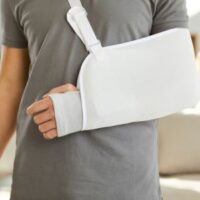What Is An Inference And How Is It Used In An Injury Case?

You probably know that in your car accident case, you have to prove that the Defendant was negligent. That means putting on the evidence you need to show every part of your case. Or does it?
Using Inferences
Actually, there are some things in your personal injury case that you don’t have to prove, because they can be inferred.
An inference is a conclusion that someone draws from the facts, facts which lead to an obvious conclusion. You can think of an inference as an assumption, and while it’s often not good to assume things in real life, in a courtroom, assumptions and inferences happen all the time.
The conclusion made—the assumption—must be more than just a mere possibility, but rather, must be probable.
Let’s say that you are driving, and you hit a large couch in the middle of the roadway. On the side of the road is a pickup truck, with its bed open, and a bunch of large furniture halfway out of its truck bed.
Did you see the couch fall out of that truck? No. But could you safely infer that the truck in the road came from the back of that truck, which has furniture in its bed, and is just feet away from where you hit the couch? Of course you can.
Let’s assume that you fall on water in the front of the store. You don’t know how long that water was there. But if it had numerous footprints, was grimy, and was smeared over a large area, could you safely infer that it had been there for a long time? Yes, you could.
We make these inferences all the time in life, and the law allows a jury to do the same thing with evidence in your case.
What you cannot do in court, is stack inferences on top of each other to make a conclusion.
So, let’s look at our water on the floor example. You could infer that the water had been there for a long time—long enough for someone to see it. Could you then infer that the store was negligent just based on that? No, you could not—you would still need to prove that the store was negligent.
You could use the fact the water was on the floor for a long time to help you prove that negligence, but a jury could not say “the water was there a long time, so the store was negligent,” without any other proof. You would have to show that the water came from a store’s mop, or that the store didn’t inspect its floors enough, or show some other fact that demonstrates the store’s negligence.
We can help you understand what to expect in your personal injury trial. Contact the Tampa personal injury lawyers at Barbas, Nunez, Sanders, Butler & Hovsepian and schedule a consultation today for help or with questions you may have about your injury or accident.
Sources:
mass.gov/guide-to-evidence/article-iii-inferences-prima-facie-evidence-and-presumptions#:~:text=An%20inference%20is%20a%20step,it%20is%20reasonable%20and%20possible.
plaintiffmagazine.com/recent-issues/item/inferences-explained
